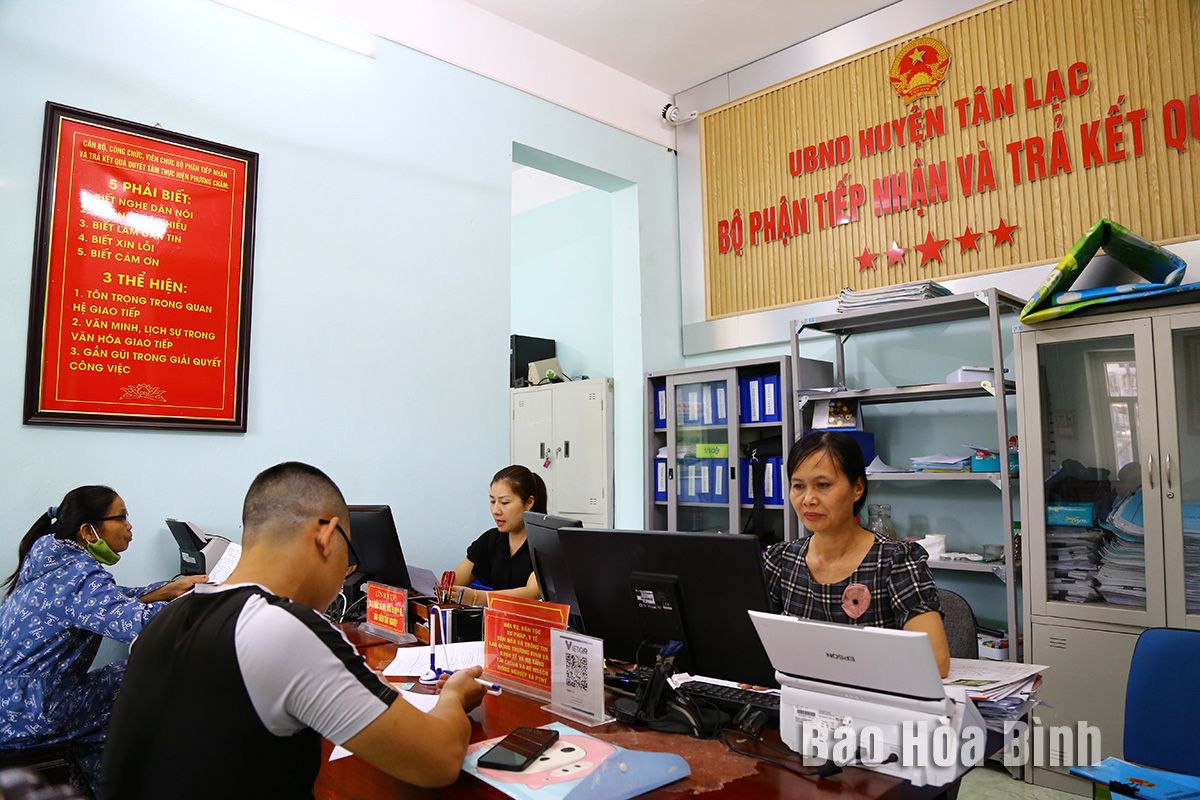
Recognising administrative reform as one of the key tasks, units and localities within the province have rolled out concerted measures to build an administrative apparatus that better serves the needs of the people and businesses.

The operation of Tan
Lac district’s unit for administrative document reception and results return
meets the demand from organisations and individuals in the area.
According to Ha Minh Phuc, the head of the Tan Lac internal
affairs office, to date, all the 16 local communes and towns have developed
their own one-stop sections.
Similar to Tan Lac, in recent times, administrative reform
activities have been cohesively and practically implemented across various
levels and sectors in other localities. Authorities have met enterprises and
investors and resolved obstacles facing their investment and business
activities this year. Dialogues with local youth in the districts of Yen Thuy
and Kim Boi have been organised, while efforts have been intensified to resolve
issues impeding the province’s key projects and missions.
Hoa Binh is set to continue the operation of the provincial
public administration service centre as well as units for administrative
document reception and results return in 10 districts and city, and 151
communes, wards, and townships. In the first nine months of this year, the
province received 293,161 administrative procedure files. The on-time
resolution rate for administrative procedures by provincial specialised
agencies reached 99.63%. At the district and commune levels, the rate reached
99.84% and 99.9%, respectively.
To further strengthen the local administrative reform, a
series of works have been set out, including the review of related tasks
outlined for the year 2023, the attraction and mobilisation of resources for
technical infrastructure investment, and the implementation of key projects.
Measures will be implemented to improve the local indexes regarding
administrative reform, the satisfaction of people and organisations served, and
the efficiency of the provincial public administration management in 2023. It
is also important to conduct planned and surprise inspections on the
implementation of administrative reform tasks, with violations strictly
handled.
The Standing Board of the Hoa Binh provincial Party Committee has agreed in principle on a proposal by the Standing Board of the Party Committee of Hoa Binh city to gather feedback on the city’s 1:2000 zoning plan, which forms part of its broader urban development strategy.
Hoa Binh province has made notable progress in public administration reform and digital government development, with the satisfaction index among citizens and businesses reaching over 84%, according to recent government evaluations.
Thanks to great efforts by local authorities in recent times, the governance and public administration performance of Mai Chau district has been significantly improved.
In the afternoon of June 6, the Party Committee, the People's Council, the People's Committee and the Fatherland Front of Lac Son district solemnly held a meeting to celebrate the 139th anniversary of the district's founding (1886–2025) and the 79th anniversary of the establishment of the district's Party Committee (1946–2025). There was the attendance of Mr. Bui Van Thang, the Vice Chairman of the Provincial People's Council; Mr. Quach Tat Liem, the Vice Chairman of the Provincial People's Committee; Ms. Dang Bich Ngoc, the Deputy Head of the National Assembly Delegation of the province; as well as the former leaders of the province and district through various periods, who are the natives of the district.
Implementing the Politburo’s Resolution No. 57-NQ/TW on breakthroughs in science – technology, innovation, and digital transformation is a golden opportunity for the northern mountainous province of Hoa Binh to renew growth model, improve competitive edge and shorten digital gap.
Resolution 57-NQ/TW, issued by the Politburo on December 22, 2024, identifies sci-tech, innovation, and digital transformation as strategic breakthroughs to build a developed and prosperous nation. In Hoa Binh province, this spirit is not just a slogan, it’s being put into action through concrete initiatives that form a "new development triangle”: digital citizenship, digital economy, and digital administration.



